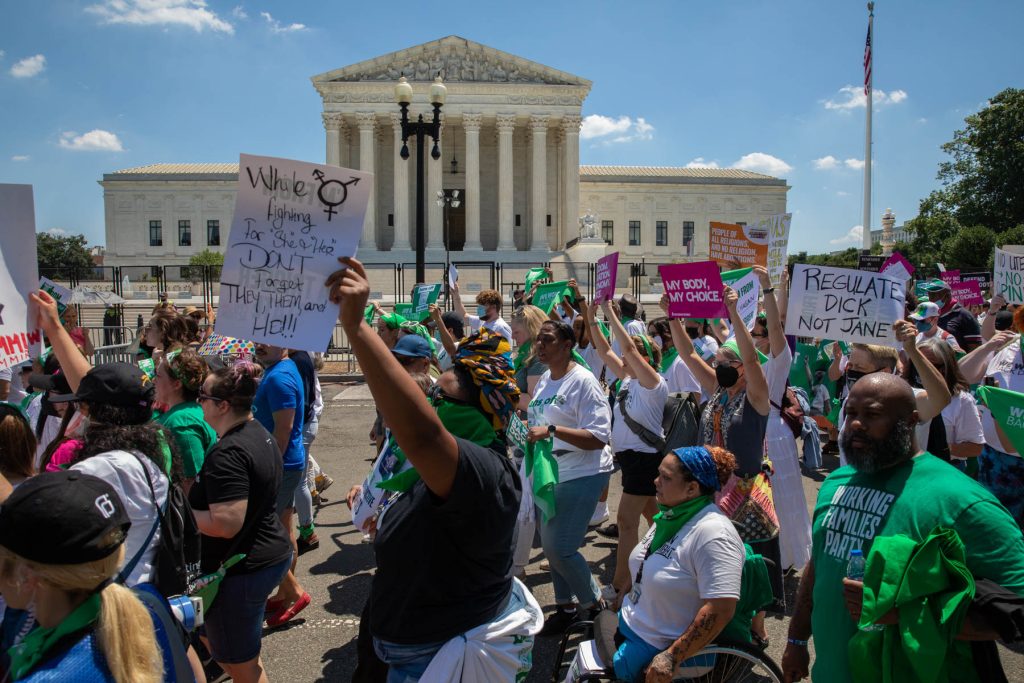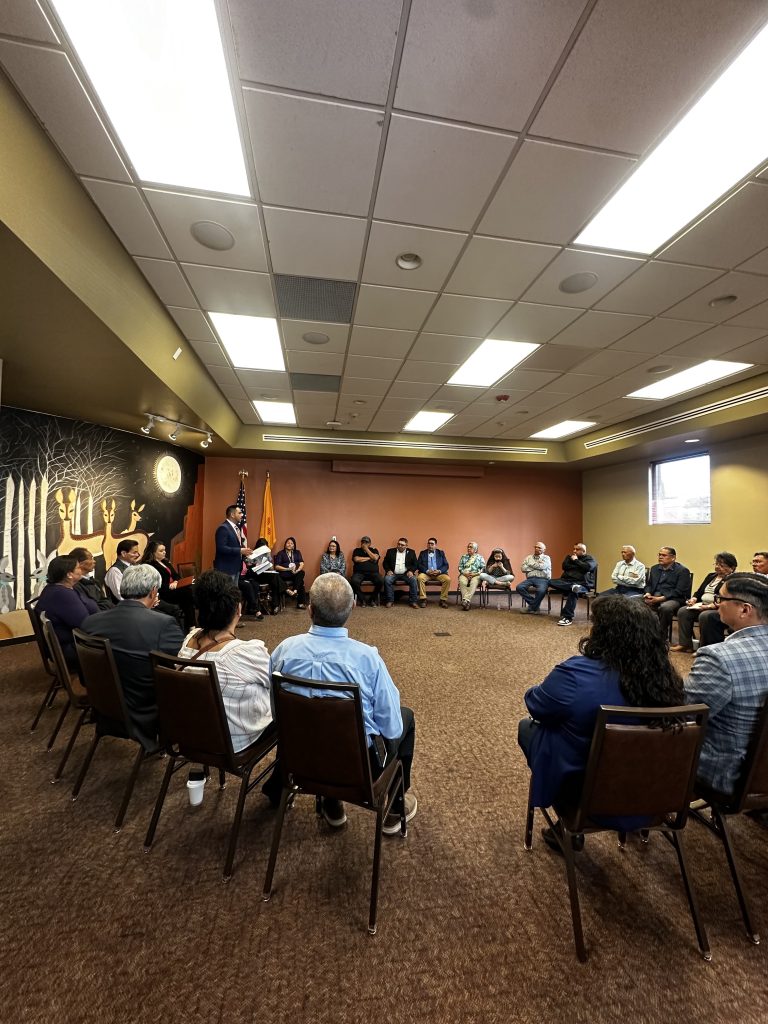When the New Mexico Legislature passed the 1969 law on abortion, it was the least restrictive version of the state’s previous abortion laws, but one advocates say would be too restrictive if it goes back into effect.
Since U.S. Supreme Court Justice Ruth Bader Ginsburg’s death on September 18, and President Trump’s nominee of conservative Judge Amy Coney Barrett, there is a heightened concern that Roe v. Wade could be overturned in the immediate future. If that happens before the state’s 1969 abortion law is repealed, the state could turn back the clock to the 51-year-old law.
An attempt to repeal the 1969 law failed in the state Senate in 2019.
Related: Senate rejects repealing currently unenforceable anti-abortion law
If it were to become the state’s law, enforcement would be a matter for each individual district attorney’s office, said Matt Baca, chief counsel for the state’s Attorney General Hector Balderas.
“Our office encourages them to focus their resources on prosecuting violent criminals who abuse children, and we support the repeal of this law to promote a person’s ability to make their own choices about their health,” Baca wrote in an emailed message to NM Political Report.
But that could mean a patchwork of enforcement across the state.
The New Mexico lawmakers wrote the 1969 law with the expectation that an abortion would be performed in a hospital – and it is written into the law that a woman who seeks an abortion would have to go before a special hospital committee to receive consent.
“This old law does not reflect the way medicine is practiced anymore,” Ellie Rushforth, reproductive rights attorney with American Civil Liberties Union of New Mexico, said.
Currently, most abortions are performed at a clinic but that, too, would change under the 1969 law.
Under the law, a woman would have to request the hearing if her health were in grave danger; if the fetus would likely suffer severe physical or mental defect or if the woman was the victim of incest or rape.
But if the woman was the victim of rape, she would have to provide an affidavit to that affect.
Women underreport rape due to shame, retraumatization and other reasons, such as the difficulties of getting to a conviction. Until recently, Albuquerque Police Department had a backlog of around 4,000 untested rape kits. One victim waited nearly 15 years for her rape kit to be tested by the Albuquerque Police Department, according to KRQE-TV.
Further, under the old law a hospital is not required to form a special hospital committee to allow a woman to make her case, nor is a hospital required to provide an abortion, even if the hospital committee gave its consent.
“Forcing a woman to plead her case to get the health care she needs reflects the lack of trust and respect for her decision-making ability,” Rushforth said.
Criminal charges could be brought against anyone providing an abortion in New Mexico outside of that narrow definition of the law and the person could be charged with a fourth-degree felony.
Establishing the potential for charges tends to put a chill on medical professionals’ willingness to perform a procedure, according to reproductive rights experts.
“This old ban could come back to haunt us and cause real damage to reproductive health care in New Mexico,” Rushforth said.
The ACLU of New Mexico argues that the law is unconstitutional because the state has an equal rights amendment. The amendment states that a person cannot be denied equal protection under the law based on gender.
The 1969 law “singles out a type of medical care that people who are not capable of becoming pregnant don’t access,” Rushforth said.
“That is clearly unconstitutional,” she said.
New Mexico passed its first law banning abortion in 1907. It refers specifically to administering “any medicine, drug or substance whatever,” as the methods for abortion in that era. The original law, written before New Mexico became a state in 1912, declared that a doctor who provided an abortion to a woman would be charged with murder in the second degree.
Rushforth said “there’s a very long history of the effort to ban and criminalize abortion,” and that it goes back further than New Mexico’s 1907 law.
“It was really when it (abortion) was largely in the purview of midwifery and people providing reproductive healthcare to women outside the medical establishment,” Rushforth said.
The medical establishment began to identify itself as a business in the late 1800s and early 1900s, she said.
“That’s when you really start to see the effort to criminalize abortion care. There’s a very long history of politicizing that kind of care,” Rushforth said.
With World War I recently over, the state passed a new abortion law in 1919 which mentioned the potential for a surgical abortion as well as “any medicine, drug, or substance whatever,” as possible methods for abortion. It was also incrementally less restrictive than the 1907 law because it allowed that if two physicians agreed that if an abortion was necessary for the health of the woman, then such an exception could be made.
When the state legislature passed the 1919 law, Native Americans were still not considered citizens. The U.S. Congress passed the 19th amendment, giving women the right to vote in 1919. Congress ratified the 19th amendment in 1920. That meant that the first presidential election women were allowed to participate in was President Warren G. Harding’s bid against Democrat James Cox in 1920. Indigenous people gained citizenship in 1924, though they were unable to vote in New Mexico until 1948.
Related: Warning: U.S. might be subjected to ‘petticoat rule’ – a celebration of women’s right to vote
The punishment for administering an abortion continued to be murder in the second degree and a felony count. But the 1919 law added fines – $500 to $2,000 – and possible prison time from 1 to 5 years for violations.
The next New Mexico abortion law passed in 1964. That was the same year as the Civil Rights Act, which eliminated laws restricting African Americans from the right to vote.
The 1964 law continued to say that “any medicine, drug, or substance whatever,” as well as surgical abortions were banned. But it also added that “any method or means whereby an untimely interruption of her pregnancy is produced,” was also illegal.
After the late 1950s, vacuum aspiration for uterine evacuation became an increasingly common method of abortion, according to a paper produced by the National Abortion Federation.
The 1964 law iterated that a woman could receive an abortion if two physicians deemed it necessary for the health and life of the woman.
A year later, the U.S. Supreme Court ruled that married couples had a right to privacy regarding childbearing decisions and that state laws that banned the sale of contraception were unconstitutional.
Just after the 1969 New Mexico abortion law passed, the U.S. Congress removed the ban on the dissemination of information about contraception from the nation’s Comstock laws in 1971. Congress passed the Comstock Law of 1873 to prevent “obscene” literature from being distributed.
When the state legislature revisited abortion in 1969, it was the least restrictive iteration of the state’s abortion bans as it recognized rape and incest as reasons why a woman should be allowed to plead her case before a special hospital committee to have an abortion.
“Medical care has advanced tremendously in the last 50 years in all areas, including abortion care,” Rushforth said. “What was maybe seen as an advancement 50 years ago is now being mirrored by anti-abortion extremists attempting to ban abortion.”






















